|
|
|
Sort Order |
|
|
|
Items / Page
|
|
|
|
|
|
|
| Srl | Item |
| 1 |
ID:
118920
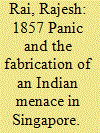

|
|
|
|
|
| Publication |
2013.
|
| Summary/Abstract |
This paper examines how local and transnational developments converged in 1857 to transform European attitudes towards Indian inhabitants in Singapore. Recognized in preceding years as useful to the security and the development of the colony, by late 1857, Indians in Singapore had come to be viewed by Europeans as a 'menace'. That change in disposition was largely the product of factors extraneous to the actions of the local Indian inhabitants themselves. Besieged by news of multiple challenges to the British Empire, European nerves were rattled by perceived threats emanating from sections of the Asian populace in Singapore. In early 1857, a dispute between Tamil-Muslims and Europeans brought to the fore the latter's anxieties and prejudices. That episode was followed, in May, by news of the massive rebellion of native troops in India. The emerging distrust for Indians was exacerbated by public rumours and fanned by editorials and reports published in the local press. Perceptions of immediate danger from the colony of transported convicts, and the fear of an Indian conspiracy during Muharram, sparked a panic that would have ramifications on the position of Indians in Singapore and leave an imprint on the long term political development of the Straits Settlements
|
|
|
|
|
|
|
|
|
|
|
|
|
|
|
|
| 2 |
ID:
147653
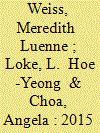

|
|
|
|
|
| Summary/Abstract |
The People’s Action Party’s unexpectedly strong win in Singapore’s September 2015 general election illuminates the dynamics of opposition under electoral authoritarianism. The conduct and outcome of the election raise questions not just of why the much-hyped opposition efforts fizzled, but also of the implications for Singapore politics, moving forward.
|
|
|
|
|
|
|
|
|
|
|
|
|
|
|
|
| 3 |
ID:
120249


|
|
|
|
|
| Publication |
Singapore, ISEAS, 2012.
|
| Description |
xvii,347p.pbk
|
| Standard Number |
9789814379649
|
|
|
|
|
|
|
|
|
|
|
|
Copies: C:1/I:0,R:0,Q:0
Circulation
| Accession# | Call# | Current Location | Status | Policy | Location |
| 057274 | 337.1/DAS 057274 | Main | On Shelf | General | |
|
|
|
|
| 4 |
ID:
140007
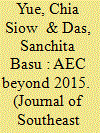

|
|
|
|
|
| Summary/Abstract |
This paper discusses Singapore’s progress in implementing the ASEAN Economic Community (AEC) and tries to explore whether the city-state has encountered any domestic conflict whilst doing so. It concludes that being a highly trade- and FDI-dependent economy, it is in Singapore’s national interest to be a part of the AEC. It is one of the leading ASEAN countries to implement the AEC initiatives. When examining domestic conflicts, Singapore presents a unique case as the city-state has long been exposed to the competitive forces of globalization, well before the development of the AEC. The country adopts non-protectionist measures to manage competitive pressures from the global economy. Almost full employment and a low incidence of poverty also minimize the negative impacts of liberalization. Case studies of the electronics and aviation sectors highlight how these two sectors are adjusting to liberalization and competition from the global economy, including the AEC. With respect to the electronics sector, which is an integral part of regional production networks, Singapore is continually progressing up the value chain. In the case of the aviation sector, the city-state continues to meet global and regional challenges through cooperative arrangements with the aviation industries of other countries and by upgrading and expanding its air services.
|
|
|
|
|
|
|
|
|
|
|
|
|
|
|
|
| 5 |
ID:
151250
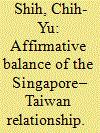

|
|
|
|
|
| Summary/Abstract |
The relational turn of IR stresses the processual constitution of the state. The indigenous theory of Chinese IR adopts the relational turn but contends that the Chinese experiences are distinctive. Relying on the case of Singapore-Taiwan relationship, this paper argues that the Chinese relationality attests to a bilateral sensibility that does not confront the relational turn in general, which is multilateral. The case further contributes to the relational turn in showing non-security and affirmative components of relationality to the extent that the studies of the relational turn have remained embedded in the security concerns. The case applies the theory of “balance of relationship,” in which nations can practice self-restraint not in response to unilateral strategic calculus or multilateral rule making, but to bilateral reciprocity. The balance of relationship of the two proceeds at both the statist and the personal levels, introducing the affect of passion to the relational turn.
|
|
|
|
|
|
|
|
|
|
|
|
|
|
|
|
| 6 |
ID:
126984
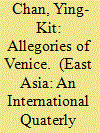

|
|
|
|
|
| Publication |
2013.
|
| Summary/Abstract |
This paper argues that although the state elites of Singapore use “Venice” as an image to legitimate the People's Action Party's continuous rule and unpopular immigration policies, the image has both empowered and constrained the state. To the state, Venice serves as a keyword that conjures up dynamism, progress, and continuity; to its critics, however, Venice signals the state's willingness to focus on the intangible elements of nationhood, namely culture and the arts. These critics use the ambiguities of the Venice rhetoric to legitimate their own appeals for change, especially after discovering that the “shared vision” of Venice is mainly in economic terms. By so doing, detractors of the state contest the centrality of economics in the making of modern-and future-Singapore, rendering the use of “Venice” as an image to promote the concept of a Global City problematic.
|
|
|
|
|
|
|
|
|
|
|
|
|
|
|
|
| 7 |
ID:
107986
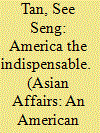

|
|
|
| 8 |
ID:
076083
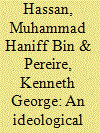

|
|
|
| 9 |
ID:
098121
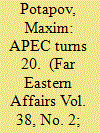

|
|
|
|
|
| Publication |
2010.
|
| Summary/Abstract |
The author examines the results of the APEC forum events in Singapore, which he attended. He evaluates the role of the forum today as the world emerges from its financial crisis and in the future from the perspective of trade and economic liberalization and integration in the region
|
|
|
|
|
|
|
|
|
|
|
|
|
|
|
|
| 10 |
ID:
123677
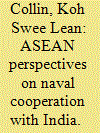

|
|
|
|
|
| Publication |
2013.
|
| Summary/Abstract |
The maritime dimension of ASEAN-India defense cooperation has always occupied a premier position given the geographical realities of Southeast Asia. Unlike air and land forces, naval forces offer policymakers strategic flexibility in the pursuit of foreign policy objectives in areas where maritime interests coincide. However, the ambiguous nature of naval forces could also be controversial, particularly in maritime zones of potential geopolitical rivalry. 1 The dual nature of naval forces is best manifest in India's naval cooperation with its ASEAN counterparts. While the Indian Navy (IN) essentially serves as a flexible diplomatic instrument of New Delhi's "Look East" policy since the end of the Cold War, its role in regional security dynamics is not without controversy, especially in the context of recent simmering tensions in the South China Sea. Hence, this article aims to examine the dynamics of ASEAN-Indian defense cooperation in the naval sphere, using the case studies of Singapore and Vietnam.
|
|
|
|
|
|
|
|
|
|
|
|
|
|
|
|
| 11 |
ID:
119610
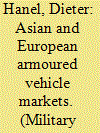

|
|
|
|
|
| Publication |
2012.
|
| Summary/Abstract |
With the start of the 21st century, the armed forces in Asia and Europe have been facing new demands as a result of radical changes in the security situation. In the foreseeable future, it is extremely unlikely that mentioned states will be threatened existentially by large - scale aggression using conventional means. Yet, safeguarding security and stability in both regions after the end of the Cold War and the need to meet global commitments for more exacting international conflict prevention and crisis management are leading to new tasks and demands placed on the Armed Forces.
|
|
|
|
|
|
|
|
|
|
|
|
|
|
|
|
| 12 |
ID:
191734
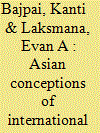

|
|
|
|
|
| Summary/Abstract |
How do major Asian states regard the current international security order? Do they agree or disagree among themselves? This is an introduction to a special section on ‘Asian conceptions of international order: what Asia wants’. It draws on articles analysing the stances of China, India, Japan, South Korea, Indonesia, Malaysia, Singapore, Thailand, Philippines and Vietnam towards the existing international security order usually described as a liberal international order (LIO). It argues that Asian states substantially support the main constitutive and regulatory norms and institutions of the LIO, but they worry that the LIO does not consistently honour these norms. Asians disagree on the centrality of political liberalism, but even Japan and South Korea, the most liberal states, are uncomfortable with strident criticism, punishment and the exclusion of less liberal states. Asians also disagree on the role of US alliances: some are strongly supportive, some are ambivalent and some are negative. Finally, Asians disagree on how they voice dissatisfaction. Japan and South Korea supplement existing norms and institutions as a way of transcending the limitations of the LIO; south-east Asian states promote ASEAN's mediatory role for peace and security above and beyond existing global arrangements; and Indonesia, India and China want to move from being norm takers to becoming norm shapers. The introduction ends with six policy implications.
|
|
|
|
|
|
|
|
|
|
|
|
|
|
|
|
| 13 |
ID:
155931
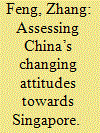

|
|
|
|
|
| Summary/Abstract |
The China–Singapore relationship withstood some major disruptions in 2016, a highly unusual year in the history of the relationship. This article offers a comprehensive examination of China’s changing attitudes towards Singapore as reflected in the wide-ranging reactions across various segments of the Chinese society to the relational tensions in 2016. It reviews the events that disrupted the relationship, identifies seven major areas of disagreement and controversy between China and Singapore, examines the diverse Chinese debates about Singapore, and outlines major challenges for the future of the relationship. Although some of these disruptions in 2016 were incidental and may be explained by tactical misunderstandings and misperception, deeper strategic causes were also at play and may resurface in the future.
|
|
|
|
|
|
|
|
|
|
|
|
|
|
|
|
| 14 |
ID:
146528
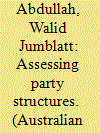

|
|
|
|
|
| Summary/Abstract |
This article attempts to answer the puzzle of why, amongst undemocratic states, some regimes are more authoritarian than others. The author contends that differing party structures result in different authoritarian outcomes. A ruling, competitive authoritarian regime that has a party structure akin to a cadre party, or where there is little or no intra-party democracy, is more likely to be more authoritarian than a party which has intra-party democracy. The lack or absence of intra-party democracy ensures that elites remain cohesive and that there are lesser opportunities for the opposition to take advantage of divisions in the party, whereas in a party with intra-party democracy, there is a greater possibility of elite disunity, which could be capitalised on by the opposition, and there is also a greater likelihood of a different ideology being propagated by defectors from the party. The cases of the People's Action Party in Singapore and the United Malays National Organization in Malaysia are used to illustrate the author's case.
|
|
|
|
|
|
|
|
|
|
|
|
|
|
|
|
| 15 |
ID:
065764
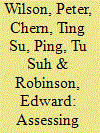

|
|
|
| 16 |
ID:
072651
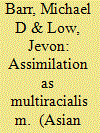

|
|
|
|
|
| Publication |
2005.
|
| Summary/Abstract |
The myths of meritocracy and multiracialism 'explain' between them both the 'fairness' of the Singapore system and the subordinate role of the non-Chinese minority races. They also purport to assure the minorities that they enjoy full status as members of the nation-building project and that their cultural and religious mores are embraced and protected within its framework. Using the Malay minority as its case study, and arguing from archival, oral, official government and secondary sources, this paper argues that the Singapore systems of meritocracy and multiracialism have not been concerned primarily with intercommunal tolerance since the 1970s, but are now programmes of assimilation of the racial minorities into a Chinese-dominated society.
|
|
|
|
|
|
|
|
|
|
|
|
|
|
|
|
| 17 |
ID:
131205
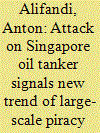

|
|
|
| 18 |
ID:
075789
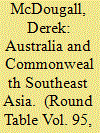

|
|
|
|
|
| Publication |
2006.
|
| Summary/Abstract |
Australia has historical links to the contemporary states of Malaysia, Singapore and Brunei through the British Empire and Commonwealth. While Australian relations with these countries in more recent times have been influenced by a range of factors, the Commonwealth connection remains significant. Politico-cultural tensions complicated the Australian relationship with Malaysia during the Mahathir era from 1981 to 2003. Nevertheless, the substantive aspects of the relationship remained strong. There was potential for cultural tensions in the relationships with Singapore and Brunei but no major rifts developed; Singapore has been a key partner for Australia in the region. Thus Australia has strong relationships with the three states of Commonwealth Southeast Asia in the areas of security, economics and education, with the imperial and Commonwealth past being a contributing factor in each case
|
|
|
|
|
|
|
|
|
|
|
|
|
|
|
|
| 19 |
ID:
117186
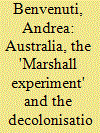

|
|
|
|
|
| Publication |
2012.
|
| Summary/Abstract |
As decolonisation gathered pace in Southeast Asia, Singapore became a source of considerable concern to the Robert Menzies government. Britain's hold on its colony appeared increasingly precarious as political turbulence gripped the island. With a predominantly Chinese population, Singapore was considered susceptible to communist China's propaganda and subversion. By relying on previously classified Australian and British diplomatic documents, this article sheds light on the Australian approach to Singapore's political and constitutional development between 1955 and 1956 and, in so doing, it hopes to make a contribution to a better understanding of Australia's policies in a rapidly decolonising Southeast Asia.
|
|
|
|
|
|
|
|
|
|
|
|
|
|
|
|
| 20 |
ID:
151445
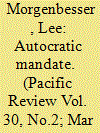

|
|
|
|
|
| Summary/Abstract |
This paper explains how authoritarian regimes employ flawed elections to obtain both short-term legitimacy and long-term stability. In conjunction with the use of co-optation and repression, it argues that ruling parties hold de jure competitive elections to claim what is termed autonomous legitimation. This denotes the feigning of conformity to the established rules of the constitution and the shared beliefs of citizens. Regardless of overall turnout and support, ruling parties exploit the normative and symbolic value of elections in order to establish moral grounds for compliance within a dominant-subordinate relationship. In support of this argument, the case of Singapore's People's Action Party (PAP) is analysed in historical and contemporary terms. Since 1959, the PAP has used precisely timed elections to extract one or more mandate types from citizens and, by extension, claim legitimacy. In particular, it has sort a mandate based on its response to an event, execution of a policy and/or collection of a reward. In the long run, autocratic stability has been achieved through a process of reciprocal reinforcement, which has combined autonomous legitimation with targeted co-optation and low intensity coercion. The paper concludes by addressing the generalisability of this finding for other authoritarian regimes in Southeast Asia.
|
|
|
|
|
|
|
|
|
|
|
|
|
|
|
|
|
|
|
|
|